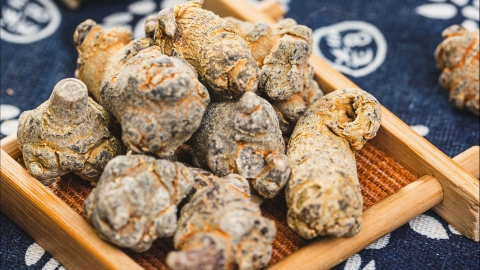What are the side effects of Panax notoginseng?
Generally speaking, as a traditional Chinese medicinal herb, Notoginseng (Sanqi) has various therapeutic values. However, some side effects may occur during its consumption. Possible side effects of Notoginseng include allergic reactions, decreased blood pressure, gastrointestinal discomfort, increased bleeding risk, and liver damage. A detailed analysis is as follows:

1. Allergic Reactions
Certain individuals might be allergic to Notoginseng, experiencing allergic symptoms such as rash, skin itching, and breathing difficulties. If allergic symptoms occur, discontinue the use of Notoginseng immediately and seek medical treatment. Allergic reactions can vary among individuals, so it is advisable to understand one's allergy history before taking Notoginseng and to carefully monitor bodily reactions.
2. Decreased Blood Pressure
Notoginseng has a blood vessel dilating effect; excessive consumption may lead to a drop in blood pressure. For individuals with already low blood pressure, this may cause adverse effects such as dizziness and fatigue. Therefore, blood pressure changes should be closely monitored when taking Notoginseng, and overdosage should be avoided.
3. Gastrointestinal Discomfort
Some individuals may experience gastrointestinal discomfort after taking Notoginseng, including symptoms like nausea, vomiting, abdominal pain, and diarrhea. This may be due to the irritation of the gastrointestinal tract by saponins present in Notoginseng. If gastrointestinal discomfort occurs, reduce the dosage or discontinue the medication and consult a physician.
4. Increased Bleeding Risk
Notoginseng has the effect of promoting blood circulation and removing blood stasis; however, excessive intake may increase the risk of bleeding. During Notoginseng consumption, if abnormal bleeding occurs, such as bleeding gums, nosebleeds, or heavy menstrual flow, prompt medical attention should be sought. This is because saponins in Notoginseng, such as notoginsenosides and ginsenosides, may enhance blood circulation and consequently increase bleeding tendency.
5. Liver Damage
Long-term and excessive use of Notoginseng may cause liver damage and lead to abnormal liver function. Flavonoids in Notoginseng are metabolized in the liver, and excessive intake may increase the liver's workload, resulting in liver cell damage. Therefore, when using Notoginseng, it is particularly important to control the dosage and avoid long-term, high-dose consumption.
When taking Notoginseng, it is essential to control the dosage, understand one's allergy history, monitor blood pressure changes, and use it rationally under a physician's guidance. If any discomfort or abnormal symptoms occur, prompt medical attention should be sought.







